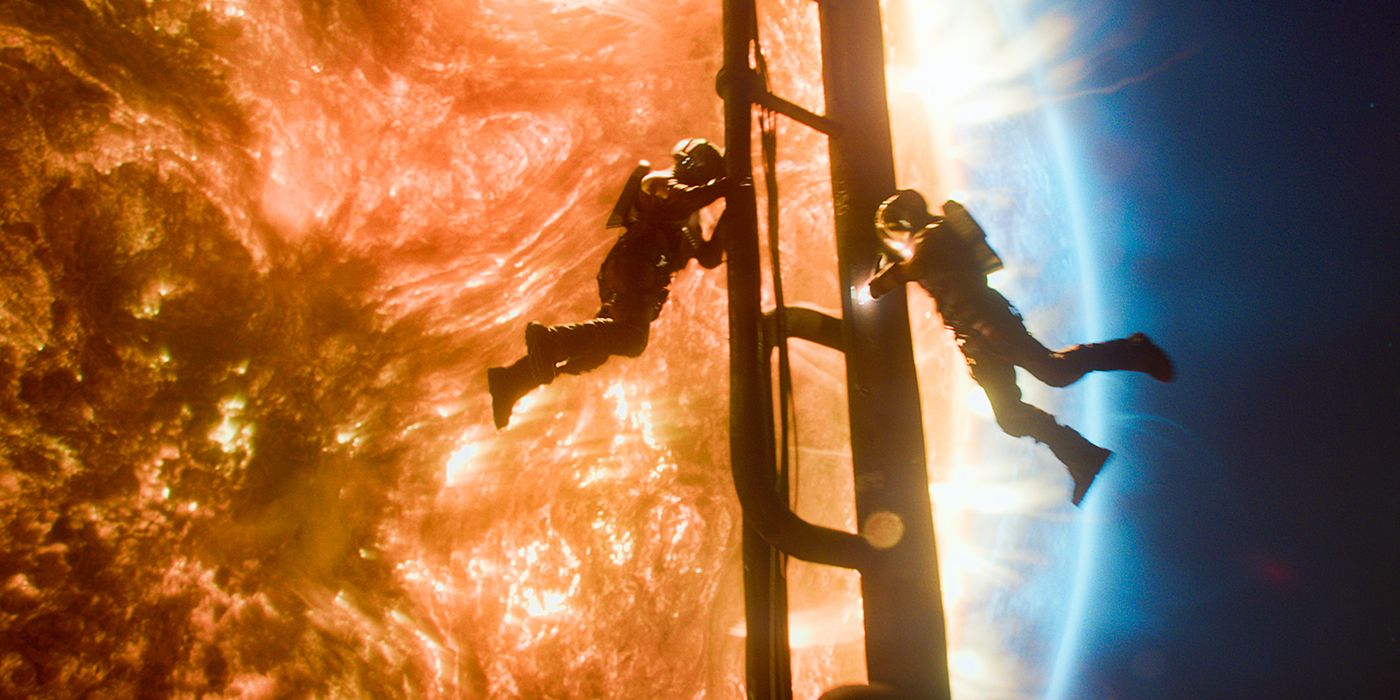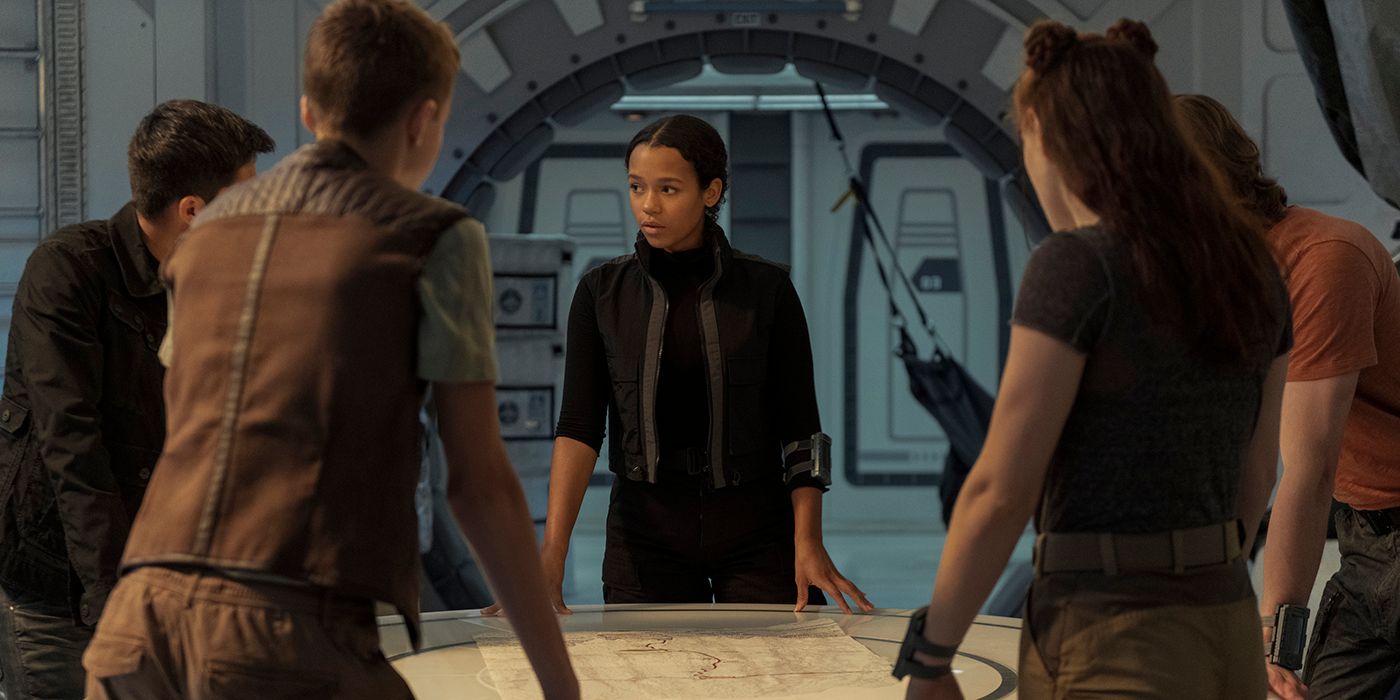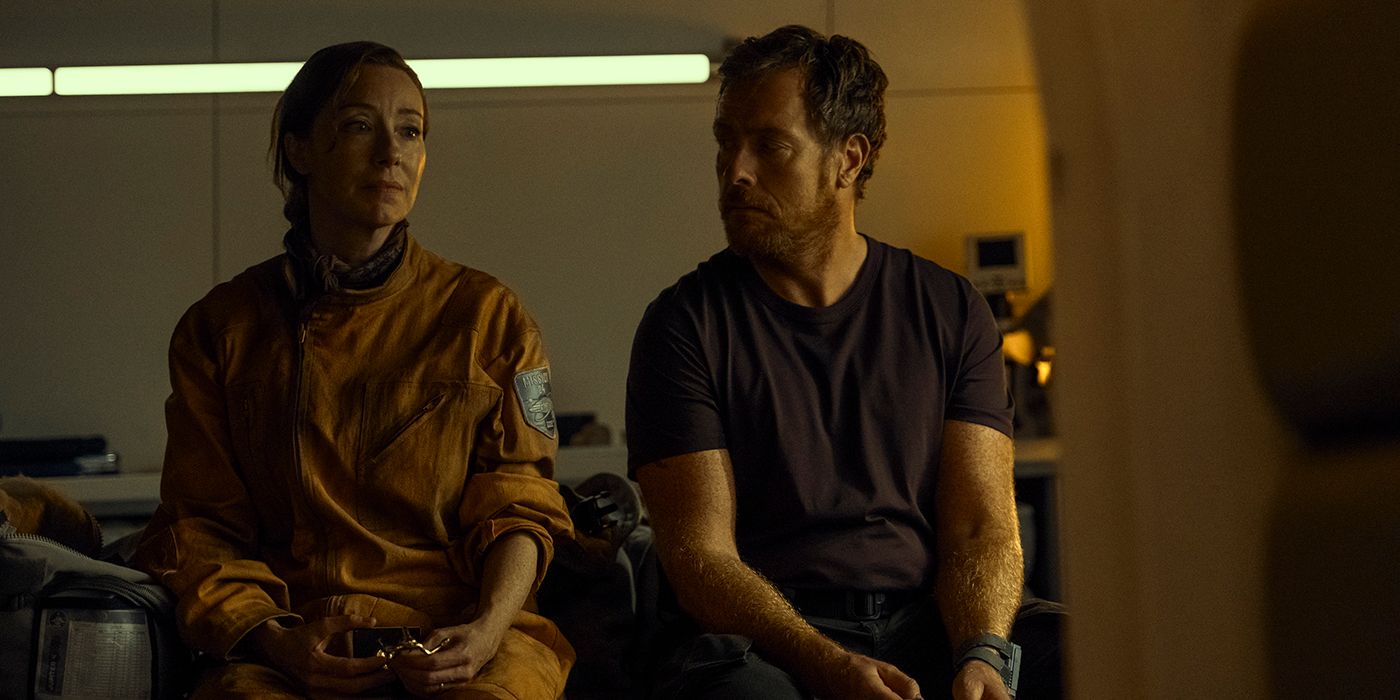
Lost in Space returns to Netflix for its third and final season on December 1, following in the footsteps of the classic Irwin Allen series from the 60s. The show follows the adventures of a family of spacefarers who were waylaid on the way to their new colony. Only this time, the stakes are higher than ever: the Robinson kids are separated from their parents, and an army of robots is headed directly towards youngest son Will Robinson (Maxwell Jenkins, Joe Bell).
The rest of the family must deal with their own issues as well. While Maureen (Molly Parker, Deadwood) and John (Toby Stephens, Hunter Killer) try to figure out a way back to their kids, eldest daughter Judy (Taylor Russell, Escape Room) must take charge of the young colonists in their care while potentially seeking out her birth father, and younger daughter Penny (Mina Sundwall, Legends of Tomorrow) struggles with feelings of resentment and possibly her own love triangle.
Showrunner Zack Estrin and Executive Producers Matt Sazama and Burk Sharpless spoke with Screen Rant about the changes each Robinson grapples with in the final season, and what's in store for the legacy of the franchise.

Screen Rant: It's been a hot minute since we've had Lost in Space in our lives, and so much has changed in the world. It almost feels like a parallel to coming back a year later in a totally new environment. What was that like for you, stepping back into the world of the Robinsons?
Zack Estrin: Stepping back into the writing of it is different than stepping back into the production of it when the world has gone upside down in between. When we came back into writing that, we had the same writing staff that we had for all our seasons, which has just been fantastic. We have these incredible writers, and everybody goes away in between seasons and works on other things - but they all come back together and come up with these stories.
It's like having a family reunion, where we get to have a Thanksgiving dinner with maybe a little bit less fighting over the course of four or five months. We've all been together since the Robinsons were kids, and we've all grown as parents over the course of the show. Some of our writers have had their first kids, some have had their second, and some writers' kids are now growing up. Writing this show, everybody brings in new experiences coming into each season, so it was a fantastic thing coming back together. And we're also fortunate that Matt and Burke walk in on day one and go, "Guys, here's the ending," which always makes everything easier.
Filming it, though, was a big challenge. I think we were all lost in space in our own way. We were all faced with this new challenge of how do we as a family overcome it together like the Robinsons do? A lot of it is in the same way too: we use science to get out of it. We have our protocols.
I think we were one of the very first shows back in production, and we managed to go through it without having any major complications or shutdowns. I think part of that has to do with the fact that we were a three season show, so we were already a family. When you have these masks up, I couldn't imagine starting together on this journey without being able to see each other and really get to know each other.
Walking into this, even though we couldn't read each other's facial cues, we knew where our hearts and minds were. When doing a show like this together, having that familiarity was a huge help. The Robinsons would be able to do this if they had face masks on, so we were like the Robinsons coming back to make this show and trying to figure it out.
When we start the season, the Robinsons are separated like never before. It also creates two separate storylines that have to merge together eventually. What is it like to ping pong back and forth, and how does that bleed into the mindset of these family members?
Matt Sazama: It was a real challenge because part of the show was the Robinsons all being a family unit and playing that together. On one hand, it was exciting for us as writers, because these are new storylines that we get to tell. What happens when your parents aren't there to help you? What happens when you're a parent, and your kids aren't there? It was exciting for us to be able to tell new stories because one of the things we really pride ourselves on in the show is that every season is different. The characters keep evolving and we're not trying to see the same scenes over and over again.
That was exciting as a writer up to a point. But the heart of the show is also seeing these characters together, so there was a lot of talk early on where it was like, "What's the best way to get all these new scenes, but then give the audience what they really want: the family together again?" As you know, they do reunite, and then it's a race to the finish with the family together once more. The last four episodes, I think, take place over the course of two days.
Speaking of the kids, they're in charge of 97 young souls in what is the biggest babysitting job ever. And not all of them respond to this responsibility in the same way. Can you talk about the mindset of each Robinson child at the start of the season?
Burke Sharpless: We built the beginning of the season around a first half of the season plot, which was very much Judy Robinson shouldering the responsibility of leading the kids. She's the one who basically presses forward with the idea, in the finale of season 2, to separate from the parents - which is unthinkable, because the Robinsons stick together. She has been a warrior to keep their family together for two years, and then she turns it on its head because that's the only way to survive.
Her story of that, and the incredibly important story - which is frankly one of the most important stories of the entire show that we've been talking about for years - of meeting her biological father. That was its own really cool, amazing, and emotional thing to go through with the entire writers' room. We wanted it to fill its own spot that was defined against all the things you might think it would be but to let it be beautiful and profound and complicated, and everything it would be in reality. That Judy story was sort of the essence of the first half.
And then you have this other really profound story where Will is isolated, and he is put in a position where he believes that it's all his fault and he's the only person who can fix it. It's a classic Hero's Journey moment, that you can see in the iconic Harry Potter stories and in myth, where there's a young individual who believes that they are the only person who can solve it. That feeling, that he may be that tragic hero who can fix it with his robot, weighs on him and pushes him further and further away from everyone. He's absolutely isolated and alienated and scared when we first meet him at the very beginning.
As usual, poor Penny gets stuck in between for the first half of the season. But wait until you watch the last four: you're gonna see that it's all a setup to a huge payoff with her. Penny is the person in the family who's living her life and trying to be normal, which is so much of what she represents for this show. You see her in what seems a little bit like a silly love triangle perhaps, where she's just being a teenager. But, really, that's just a covering for her to try to figure out who she is. Because her essential story is she doesn't believe in herself. She doesn't know the power she has as a Robinson; she doesn't know the depths that she can go to solve problems and perhaps rise to be maybe greater than any other Robinson in her own way.
Those are the three big stories that we found ourselves with at the beginning of the show and allowed those things to play out over the course of the entire season.

As was already hinted, Maureen and John may be feeling a little lost without their kids and what it means for them to be parents in absentia. What is the state of their union this season?
Zack Estrin: I'm sitting here as my daughter is going through college applications, so I'm preparing for this idea of, "What is life when the thing that you've been building it around for the last 18 years is going to change?" We are taking this very common thing that a lot of adults go through, which is, "Who are we without our kids," and we are putting it in space and in life or death situations. How are they going to survive?
That's kind of a Lost in Space thing, which is to take a relatable problem and turn it up to 11. That's essentially where John and Maureen are. Not to mention the fact that they're wrestling with their guilt of the end of season 2, because they made a choice to send their kids off - particularly for John, who fought this whole time just to get his family back together. You'll see him talk about it in season three with Will: he made a promise early on to never leave again, and here he is now having left. He is experiencing that loss all over again.
John and Maureen are dealing with this in their own very different ways; they're coping with this loss, and they haven't yet figured out how to cope with it together. They're trying to do it on their own, which is a theme that Matt touched on earlier. You can't do this show alone. When you're a family, you've got to be together. In fact, even if you don't have a family, everyone in the world has to embrace each other in order to get through these times together.
That is a very good lesson to learn in these times. Speaking of turning things up to 11, the threats increase as the end game draws near. How did you level up in the writers' room to make robot crises seem ever more present?
Matt Sazama: Oh, there are a lot of robots. I think all we did was write "more robots" on the whiteboard, and that was it. Now with a million times more robots.
Yes, there are more robots, and they look amazing. But I think for us, the biggest thing to bring up the threat is that it's always a personal threat. And it's always personal with Will Robinson, especially because he feels like it's his job to fix this problem. We're going to find out that perhaps it's not.
Not to give spoilers away, but it's gonna become very personal for Will Robinson. He's going to be tested, not just by having to fight a bunch of robots or whatever that is, but by understanding the psychological element to success and failure and what it means to have this pressure on you. And to us, that's the real drama of this season. It's one thing to fight a bunch of robots, but another thing to let your family down and not live up to your expectations, or to just be flat-out wrong about things. How do you recover from that?
Zack Estrin: With two kids in high school, it's fascinating how this show is a really great metaphor for the pressure that is put on kids. If you look at how Will chooses to deal with some of the stuff that you have to deal with this year - without acknowledging it, it's this really great message for how to get through some of these challenging times when you think it's all on you.
The show ending is bittersweet. But you still have a relationship with Netflix. Are there any thoughts for a Lost in Space spin-off or continuing the legacy in some way?
Zack Estrin: The way that we've always viewed this is that Lost in Space has been around before this iteration, and there's no doubt that it will continue because the story is universal. But for us, we were writing one chapter of the Robinson story. And I think that because of the nature of it - it takes two years to make a season of this show - that if Lost in Space was to continue, it would be different. Will Robinson has grown up, and the family is becoming a different unit.
If it was to continue, I think it would look very different than it certainly does now. Just like this show looks very different than the original one that was in the 60s. But the story is so timeless, there's no doubt that the Robinsons have future stories in someplace - who knows where or in what medium. But there are many more stories to tell.
For me personally, working with Netflix has been so fantastic that it's just amazing to continue telling stories with them. I can't talk too much about some of the next things that are coming, but they are coming. There are a lot of great things to do together as the years go on.
I am very much looking forward to those things and, Burke and Matt, I'm also looking forward to Morbius.
Burke Sharpless: We've talked about it. We started writing Morbius at the same time that we originally started pitching Lost in Space and doing it. In that time, we've done three seasons of the show, and the movie still hasn't come out yet.
All 8 episodes of Lost in Space's third season premiere December 1 on Netflix.
from ScreenRant - Feed https://ift.tt/3xIeWZg


0 Comments